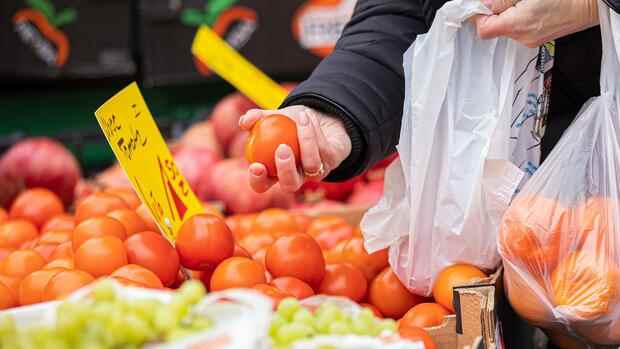Berlin In view of rising food prices, Hamburg’s Senator for Consumer Protection, Anna Gallina (Greens), is calling for a VAT exemption for certain foods. The Greens politician wants to make a corresponding move at the consumer protection ministers’ conference in Weimar next week.
“Due to the loss of certain goods and the sharp increase in costs, food prices have also risen significantly,” said Gallina. This hits consumers “with full force”, especially people with small and middle incomes.
“We have to take countermeasures here in the interests of effective consumer protection – quickly, appropriately and effectively,” warned the senator. Therefore, the sales tax on food should be abolished. “A balanced diet must not fail because of the costs,” says Gallina.
With her initiative, the senator wants the federal government to examine appropriate measures. The focus is on fruit and vegetables in particular, but also legumes, eggs, fish, cereals, dairy products and plant-based alternatives to dairy products.
Top jobs of the day
Find the best jobs now and
be notified by email.
Life in Germany has skyrocketed in price since the start of the Ukraine war, and there is no sign of an easing in consumer prices for the time being. Energy and food prices continue to rise. According to the Federal Statistical Office, food prices rose by 11.1 percent in May compared to the same month last year, the most since reunification.
New EU directive allows tax exemption for food
The Value Added Tax Act regulates which products are subject to the reduced rate of 7 percent instead of 19 percent. The seven percent applies to foods such as meat, fish, fruit, vegetables, flour, baked goods or oils. But firewood, newspapers, books, sheet music, prostheses or works of art are also subject to the reduced tax rate.
According to the monthly report of the Federal Ministry of Finance, 35.75 billion euros in sales taxes flowed into the state coffers in March alone. That was almost 41 percent more than in the previous year. In January and February of the current year, the state had already collected 51.2 billion euros in VAT, which was 14 billion euros more than in the first two months of 2021. For comparison: last year, tax revenue from sales totaled 113.13 Billion euro.
>> Read also: “A blessing this year”: who receives holiday pay and how much
The Federal Association of Consumers (VZBV) also campaigned for the abolition of VAT for fruit, vegetables and legumes. “That would have a steering effect for a healthier and more sustainable diet and would at least relieve consumers in the current situation,” said Christiane Seidel, a consultant in the VZBV food team, to the Handelsblatt. “However, we reject a VAT exemption for food of animal origin.”
The social association VdK and the German Diabetes Society called on the federal government to use a new EU regulation on VAT exemption. A change to the so-called EU Value Added Tax System Directive recently came into force largely unnoticed.
In the directive, the EU states have set common requirements for value added tax: The regular tax rate must therefore be at least 15 percent, the reduced rate at least five. Complete tax exemptions are only possible in certain areas, since the change now also for food.
Federal Minister of Agriculture Cem Özdemir (Greens) recently campaigned for a VAT out on food. In addition to relieving low-income households, this would also create an incentive for healthier eating. However, it is clear to him that the proposal will not trigger storms of enthusiasm among all coalition partners, he told the “Welt am Sonntag”.
In view of the record-breaking increase in food prices, the vast majority of Germans are increasingly paying attention to special offers. 85 percent do so, according to a survey of consumers for the German Retail Association (HDE) published on Friday. In the income group of up to 2,000 euros per month, it is even more than 91 percent.
“The rising cost of living caused by the effects of the corona pandemic and the Russian war in Ukraine have serious consequences for consumer behavior,” said HDE CEO Stefan Genth. “In view of the future prospects, which are perceived as uncertain, many prefer to keep their money together and are rather skeptical about larger purchases.”
More: Price jump in the supermarket: Many consumers are now giving up fish and meat
